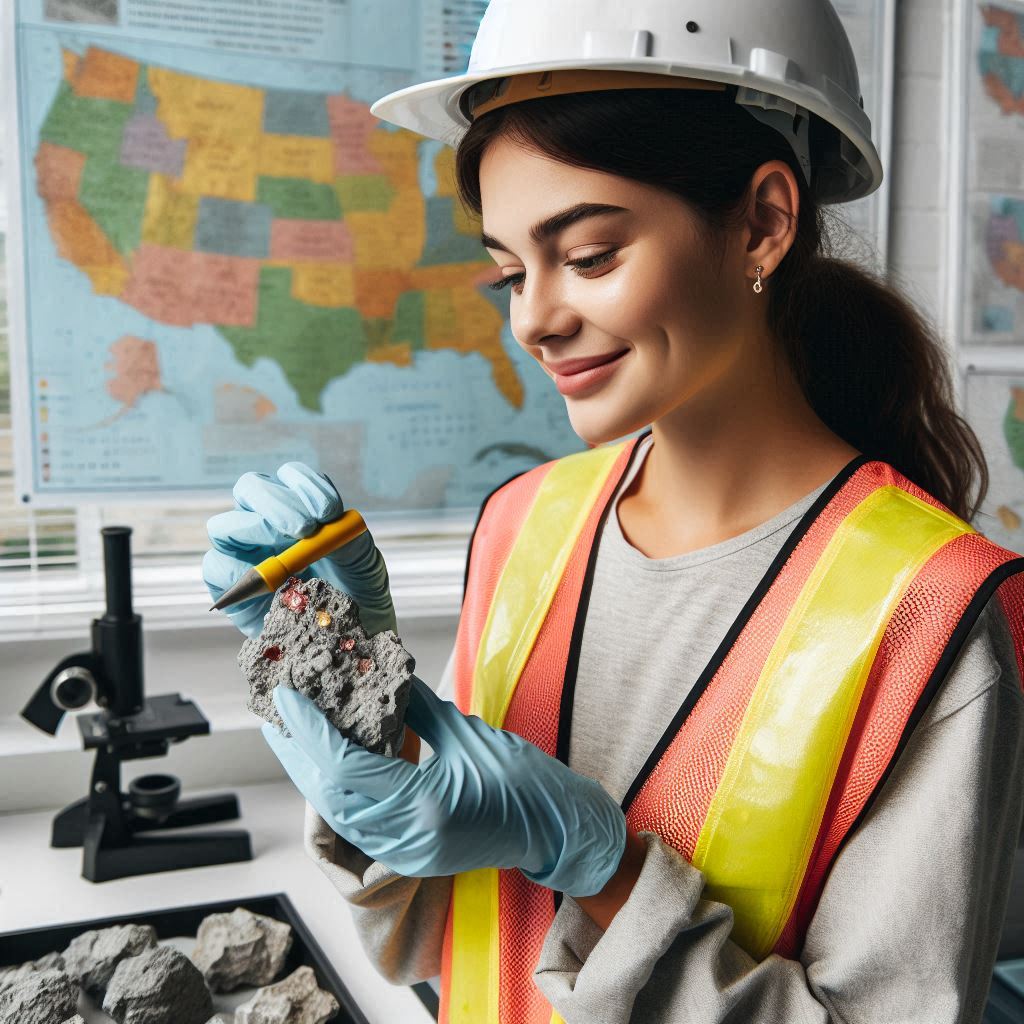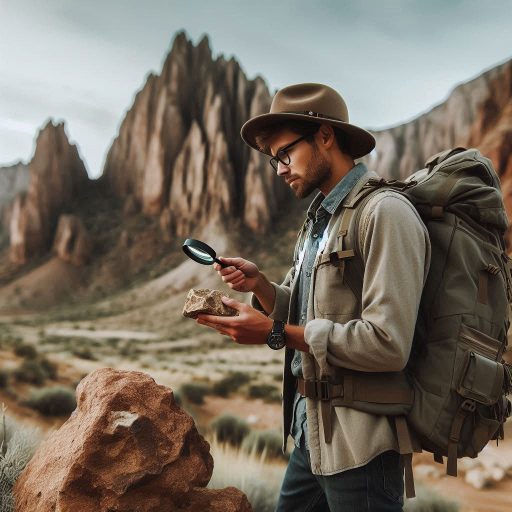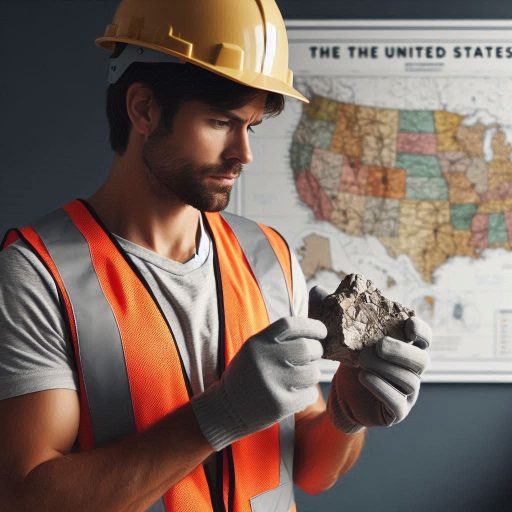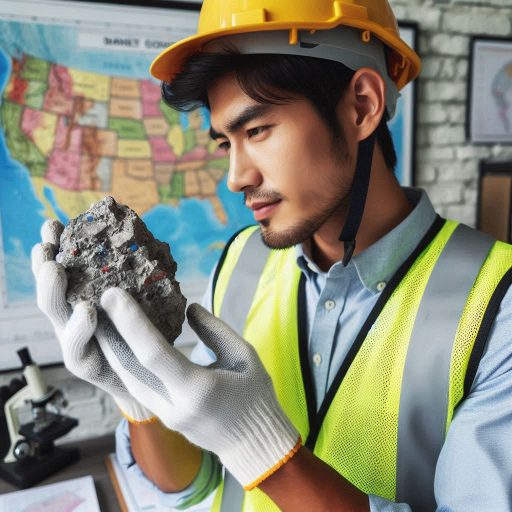Introduction
Women in geology have made significant strides in recent years.
Historically, this field has seen a lack of representation and opportunities for women.
Traditionally male-dominated, geology often overlooked the contributions of female scientists and professionals.
In the past, societal norms and biases discouraged women from pursuing careers in geology.
Many talented women faced barriers to entry and advancement.
This lack of representation limited the diversity of perspectives in geological research and practice.
Recently, the landscape has begun to change.
More women are entering geology programs in universities and gaining recognition for their work.
Organizations now actively promote gender diversity, providing scholarships and mentorship programs for aspiring female geologists.
Women have achieved remarkable milestones in the field.
They have led groundbreaking research, made significant discoveries, and held leadership roles in major organizations.
Increasingly, women contribute to important discussions about climate change, resource management, and environmental sustainability.
These advancements inspire future generations of female geologists.
They show that women can thrive and lead in this vital field.
As representation improves, the geology community benefits from diverse perspectives and innovative solutions.
Together, women in geology are breaking new ground and reshaping the future of the discipline.
The History of Women in Geology
Challenges Faced by Women in Geology
Women in geology have faced significant challenges throughout history.
Historically, the field was male-dominated, discouraging women from pursuing careers in geology.
Many universities did not admit women to geology programs until the mid-20th century.
This exclusion limited their opportunities for education and professional growth.
Women often encountered skepticism about their capabilities in a predominantly male field.
They faced biases that undermined their skills and knowledge.
This skepticism created a hostile environment that made it difficult for women to succeed.
Fieldwork presented additional challenges.
Women had to navigate rugged terrains and harsh conditions often without adequate support.
Male colleagues sometimes dismissed their contributions, affecting their confidence and career advancement.
Moreover, work-life balance posed challenges for women in geology.
Many faced pressure to prioritize family over career aspirations.
This expectation limited their ability to pursue leadership roles or extensive fieldwork.
Despite these obstacles, many women persevered and continued to pursue their passion for geology.
Their resilience laid the foundation for future generations of women in the field.
Notable Women Geologists Who Paved the Way
Several notable women geologists have made significant contributions to the field, paving the way for future generations.
Marie Tharp was a pioneer in oceanography and geological mapping.
She created the first comprehensive maps of the ocean floor.
Her work fundamentally changed our understanding of plate tectonics and oceanic structures.
Another trailblazer, Dr. Inge Lehmann, was a seismologist known for her discovery of the Earth‘s inner core.
Her groundbreaking research significantly advanced the study of seismology and the Earth‘s structure.
Dr. Linda Elkins-Tanton has made notable contributions to planetary geology.
She has explored the geology of asteroids and other celestial bodies.
Her work has inspired many young women to pursue careers in geology and planetary science.
These women and many others have shattered stereotypes and opened doors for aspiring female geologists.
They have proven that women can excel in challenging environments and contribute significantly to scientific advancement.
Progress Made in Gender Equality in Geology
Over the years, significant progress has been made regarding gender equality in geology.
More women now pursue degrees in geology and related fields.
Many universities actively promote gender diversity in their programs.
Professional organizations, such as the Association for Women Geoscientists, advocate for women in the field.
They provide networking opportunities, mentorship programs, and scholarships.
These initiatives empower women and encourage their participation in geology.
Workplaces have become more supportive of women‘s contributions in geology.
Companies are implementing policies to promote diversity and inclusion.
They recognize the value of diverse perspectives in research and decision-making.
Additionally, women are increasingly taking on leadership roles in geology.
More female scientists lead research projects and hold prominent positions in organizations.
This visibility inspires younger generations to pursue careers in geology.
The growth of social media has also fostered connections among women geologists.
Online platforms allow women to share experiences and resources.
This support network enhances their professional development and fosters collaboration.
Women in geology have overcome historical challenges to achieve significant milestones.
Notable female geologists have paved the way for future generations, demonstrating resilience and excellence.
While progress has been made in gender equality, ongoing efforts are essential to ensure that women continue to thrive in geology.
The future is promising as more women break new ground in this vital field.
Read: Profiles in Success: Leading Chemists of the 21st Century in the US
Challenges Faced by Women in Geology
Existing Gender Disparities in Opportunities and Recognition
Women in geology face significant gender disparities regarding opportunities and recognition.
Despite making strides in recent years, women remain underrepresented in the field.
Studies show that female geologists often receive fewer promotions and less recognition than their male counterparts.
This disparity can lead to lower job satisfaction and diminished career prospects for women in geology.
Moreover, women often encounter challenges in accessing mentorship and networking opportunities.
Male-dominated environments can limit their ability to form professional connections.
As a result, women may struggle to find mentors who can guide them in their careers.
The lack of support can hinder their professional growth and confidence.
Funding for research projects also tends to favor male-led initiatives.
Women often face challenges in securing grants and resources.
This funding disparity can impact their ability to conduct important research.
Consequently, women’s contributions to geology may go unrecognized or underappreciated.
Organizations must work to address these disparities.
Implementing diversity and inclusion initiatives can help create a more equitable environment.
By promoting women‘s achievements, companies can foster a culture that values diversity and inclusion.
This shift is crucial for encouraging more women to enter and thrive in geology.
Stereotypes and Biases Women Geologists Often Encounter
Stereotypes and biases significantly affect women geologists.
Many people still view geology as a male-dominated field.
This perception leads to assumptions about women’s capabilities and contributions.
These stereotypes can discourage women from pursuing careers in geology.
Women often face questions about their expertise and qualifications.
Colleagues may doubt their abilities based solely on gender.
This bias can create a hostile work environment and hinder women’s confidence.
Overcoming these stereotypes requires not only personal resilience but also systemic change within the industry.
Additionally, women in geology may encounter harassment and discrimination.
These negative experiences can lead to feelings of isolation and frustration.
Addressing these issues is essential for creating a more supportive workplace culture.
Geological organizations must establish clear policies against discrimination and harassment.
Support from male colleagues is also critical.
Men must actively work to challenge biases and support their female counterparts.
Creating an inclusive environment requires everyone‘s involvement, not just women advocating for change.
The Impact of These Challenges on the Retention and Advancement of Women in the Field
The challenges women face significantly impact their retention and advancement in geology.
Many talented women leave the field due to a lack of support and recognition.
This loss of talent diminishes the diversity of ideas and perspectives in geology.
Women may also hesitate to pursue leadership roles due to a lack of encouragement.
When women do not see others like themselves in leadership positions, they may doubt their potential.
This lack of representation can create a cycle of underrepresentation in higher roles.
Furthermore, the stress associated with gender biases can lead to burnout.
Many women find it challenging to balance work and personal life while facing these issues.
As a result, some women may choose to leave the profession altogether.
Addressing these challenges requires a concerted effort from organizations and individuals.
Creating supportive networks and mentoring programs can help women navigate their careers.
Companies must also prioritize diversity and inclusion initiatives to promote equal opportunities.
Addressing gender disparities, stereotypes, and biases is crucial for women in geology.
These challenges significantly impact their retention and advancement in the field.
By promoting a supportive environment, we can empower more women to break new ground in geology and contribute their valuable perspectives and insights.
Read: The Life and Times of a U.S. Physicist: A Day in Detail
Success Stories of Women Geologists
The achievements and contributions of prominent women geologists
Women have made significant contributions to the field of geology throughout history.
Pioneering figures like Mary Anning and Elizabeth McClintock paved the way for future generations.
Mary Anning, a fossil collector in the early 19th century, made groundbreaking discoveries in paleontology.
Her work in Lyme Regis led to significant advancements in understanding prehistoric life.
Another influential figure is Dr. Marcia McNutt, the first female director of the U. S. Geological Survey.
She has made vital contributions to understanding geological hazards and oceanography.
Her leadership has inspired many women to pursue careers in geology.
Dr. Jeanette Brown is also noteworthy for her contributions to mineralogy and education.
As a mentor, she has guided countless young geologists, especially women and minorities.
Her advocacy for diversity has significantly impacted the field.
These prominent women have not only excelled in their research but also inspired future generations of geologists.
Highlighting groundbreaking research conducted by women in the field of geology
Women geologists conduct groundbreaking research across various subfields.
Dr. Lisa White focuses on sedimentary geology and paleoenvironmental reconstruction.
Her research helps understand climate change effects on ecosystems.
Dr. Ellen E. Kappel investigates geochemical processes in volcanic systems.
Her work enhances our understanding of volcanic activity and its impacts on the environment.
Furthermore, Dr. Ana Vila is making strides in environmental geology.
Her research focuses on sustainable mining practices and reducing environmental impacts.
She aims to balance resource extraction with environmental stewardship.
Dr. Karen Harpp studies planetary geology, contributing to our knowledge of Mars and other celestial bodies.
Her findings help us understand geological processes beyond Earth.
Women also lead initiatives promoting climate change awareness.
Dr. Jennifer Francis researches climate dynamics and its implications for extreme weather events.
Her work highlights the critical role of scientists in addressing global challenges.
Through their research, women geologists are breaking new ground and making significant contributions to our understanding of the Earth and beyond.
The importance of representation and diversity in shaping the future of geology
Representation and diversity are crucial in shaping the future of geology.
A diverse workforce fosters innovative ideas and solutions.
Different perspectives lead to more comprehensive research and better decision-making.
As more women enter the field, they bring unique insights and approaches to geological challenges.
Moreover, diverse representation encourages young girls to pursue careers in geology.
Role models inspire the next generation to break barriers.
By showcasing successful women geologists, we can challenge stereotypes and promote inclusivity.
Increased visibility helps create a supportive environment for aspiring geologists.
Educational institutions play a vital role in promoting diversity.
Programs encouraging girls to study science and geology are essential.
Mentorship opportunities can guide young women in their careers.
Organizations like the Association for Women Geoscientists support female geologists through networking and professional development.
In short, women in geology have made remarkable achievements and contributions.
Their groundbreaking research enriches our understanding of Earth and its processes.
Promoting representation and diversity is vital for the field’s future.
By breaking new ground, women geologists inspire the next generation and contribute to a more sustainable world.
Their achievements pave the way for a more inclusive and innovative geological community.
Read: Salary Ranges: What to Expect as a Physicist in the USA

Learn More: Nanotechnologist: Collaborating with Other Scientists
Initiatives and Programs Supporting Women in Geology
Organizations and Resources Available to Support Women Geologists
Various organizations support women in geology and related fields.
The Association for Women Geoscientists (AWG) is one prominent group.
AWG provides networking opportunities, scholarships, and mentorship programs for women geologists.
They aim to enhance the visibility and participation of women in the geosciences.
Another notable organization is the Geological Society of America (GSA).
GSA promotes diversity and inclusion within the geology community.
They offer resources specifically designed to support women geoscientists in their careers.
These resources include grants for research and travel, as well as awards recognizing outstanding contributions by women.
The Society of Exploration Geophysicists (SEG) also emphasizes diversity in the geosciences.
SEG has initiatives focused on supporting women through educational resources and scholarships.
They aim to create a pipeline of future women leaders in exploration geophysics.
Moreover, numerous online platforms and networks exist to connect women geologists.
Websites like LinkedIn and Women in Geosciences provide spaces for professionals to connect.
These platforms foster collaboration, share job opportunities, and exchange valuable experiences.
Mentorship Programs and Networking Opportunities
Mentorship programs play a crucial role in supporting women in geology.
Many organizations offer structured mentorship initiatives.
These programs pair experienced geoscientists with younger professionals or students.
Mentors provide guidance on career development, skill enhancement, and networking strategies.
Networking opportunities also abound for women in the field.
Conferences, workshops, and seminars often focus on women‘s contributions to geology.
Events like the Women in Geoscience Conference create spaces for sharing experiences and knowledge.
Attendees can connect with industry leaders and fellow geologists, fostering professional relationships.
Furthermore, regional sections of larger organizations often host local networking events.
These gatherings enable women to build connections within their communities.
Establishing a robust professional network enhances career opportunities and encourages collaboration.
Additionally, virtual networking platforms have become increasingly popular.
Online forums and webinars allow women geologists to share insights and experiences, regardless of location.
These digital spaces foster a sense of community and support among women in geology.
Importance of Creating a Supportive and Inclusive Environment
Creating a supportive and inclusive environment for women in geology is essential.
A diverse workforce brings varied perspectives and innovative solutions to challenges.
Inclusion fosters creativity and enhances problem-solving capabilities within the field.
Moreover, supportive environments help retain women in the geosciences.
When women feel valued and respected, they are more likely to remain in their positions.
Organizations should implement policies that promote equity, fair treatment, and opportunity for advancement.
Additionally, leaders in the geology field must actively advocate for inclusivity.
They should challenge stereotypes and biases that hinder women‘s progress.
Creating training programs focused on diversity and inclusion can raise awareness and foster a positive culture.
Women in geology also benefit from visibility and recognition.
Highlighting their achievements in conferences and publications inspires future generations.
Celebrating women’s contributions encourages young girls to pursue careers in geology.
Organizations and resources supporting women geologists are essential.
Mentorship programs and networking opportunities facilitate career development.
Creating a supportive and inclusive environment enhances diversity in the field.
By working together, the geology community can empower women and break new ground in the profession.
Read: Physics Specializations: Choosing Your Path in the U.S.
Current Trends in Gender Representation in Geology
Current Trends in Gender Representation in Geology
Women have made significant strides in the field of geology.
However, gender representation still lags behind in many areas.
Recent studies show that women make up about 30% of the geology workforce.
This percentage reflects a slow but steady increase over the years.
Educational institutions are now enrolling more female students in geology programs.
Many universities report that female enrollment in geology has increased by 20% in recent years.
This trend signifies a growing interest among women in earth sciences.
Despite these positive trends, women still face challenges in the workplace.
Many industries within geology remain male-dominated.
Women often encounter barriers to advancement and leadership roles.
Addressing these disparities is crucial for the field‘s future.
Mentorship programs have emerged to support women in geology.
These initiatives connect aspiring female geologists with experienced professionals.
Mentors provide guidance, encouragement, and networking opportunities.
This support helps women navigate challenges in their careers.
Opportunities and Challenges for Women in Geology
Women in geology encounter both opportunities and challenges.
The demand for skilled geologists is increasing due to climate change and resource management needs.
This demand presents opportunities for women to enter and thrive in the field.
Many companies actively seek to diversify their teams.
They recognize that diverse perspectives enhance problem-solving and innovation.
This shift creates more opportunities for women to contribute to important projects.
However, challenges remain significant.
Women often face gender bias and stereotypes in the workplace.
These biases can hinder career advancement and affect job satisfaction.
Additionally, women in geology may struggle with work-life balance due to demanding fieldwork schedules.
Networking remains a critical challenge for women in geology.
Many professional networks are still predominantly male.
This lack of representation can make it difficult for women to form connections.
Building supportive networks is essential for women‘s success in the field.
Transform Your Career Today
Unlock a personalized career strategy that drives real results. Get tailored advice and a roadmap designed just for you.
Start NowSolutions and Strategies to Promote Gender Equality in Geology
To promote gender equality in geology, several strategies can be implemented.
First, organizations must prioritize mentorship programs for women.
These programs create supportive environments where women can thrive.
Second, companies should adopt policies that promote work-life balance.
Flexible work schedules and parental leave can help retain female employees.
Creating a culture that values family life will encourage more women to stay in the field.
Third, increasing visibility of female geologists is crucial.
Highlighting women‘s achievements in geology can inspire future generations.
Public recognition of female geologists helps challenge stereotypes and promote inclusivity.
Moreover, educational institutions can support women through scholarships and grants.
Financial assistance can encourage more women to pursue degrees in geology.
These programs can help reduce financial barriers for aspiring female geologists.
Lastly, fostering inclusive workplace cultures is vital.
Training programs on diversity and inclusion can create respectful environments.
Companies should actively promote discussions about gender equality within their teams.
While women in geology face challenges, opportunities abound.
By implementing targeted strategies, the field can promote gender equality and support women.
This progress benefits not only women but also the entire geology community.
Conclusion
In this blog post, we highlighted the achievements of women in geology.
Despite historical challenges, women continue to break new ground in the field.
They contribute valuable insights and perspectives, driving innovation in geological research and practice.
Empowering and supporting women in geology is crucial for the industry‘s growth.
Diverse teams foster creativity and enhance problem-solving abilities.
Women bring unique viewpoints that can lead to groundbreaking discoveries.
By promoting gender equality, we create a more inclusive environment that benefits everyone in the field.
Mentorship programs and networking opportunities are essential for aspiring female geologists.
These resources connect women with experienced professionals who can guide their careers.
Educational institutions must also encourage female students to pursue geology.
Highlighting successful women in the field can inspire the next generation.
We encourage readers to advocate for gender equality and diversity in geology.
Support organizations that promote women in science and engineering.
Participate in discussions about gender issues within your professional network.
By actively promoting inclusion, we can create a more equitable geology community.
Everyone benefits when diverse voices contribute to scientific advancements.
In summary, empowering women in geology enriches the field and paves the way for future generations of geologists.
[E-Books for Sale]
The Big Book of 500 High-Paying Jobs in America: Unlock Your Earning Potential
$19.99 • 500 High-Paying Jobs • 330 pages
Explore 500 high-paying jobs in America and learn how to boost your career, earn more, and achieve success!
See All 500 High-Paying Jobs of this E-Book
1001 Professions Without a Degree: High-Paying American Jobs You Can Start Now
$19.99 • 1001 Professions Without a Degree • 174 pages
Discover 1001 high-paying jobs without a degree! Unlock career tips, skills, and success strategies for just $19.99!




